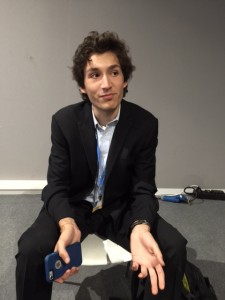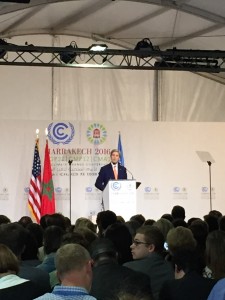Ben Goloff ’15, who is in Marrakesh with SustainUS, met with us on Wednesday, 11/16 to talk about their work, their various COP actions, and efforts to connect with environmental justice activists in Morocco. His colleague Ryan, also part of the conversation, talked about a couple of the EJ issues here, involving a silver mine pollution protest/shut-down/multi-year protest settlement at Imider and also the loss of fish stock and local livelihoods in Safi due to serious water pollution issues occasioned by companies like OCP Group, a major producer of phosphates and derivatives. Ryan designed a poster for SustainUS protesting the Safi pollution, and SustainUS had an “action” (a die-in) in the green zone where OCP was touting its environmental consciousness at COP22.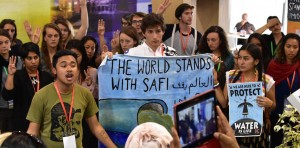
Category: COP22
The Dismantling of COP 22
Gender balance at COP – more than just bean counting
I have tried to follow discussions about gender balance at COP. I wondered whether attention to this issue was merely symbolic politics, but I discovered that there are some interesting considerations here. My former student was a negotiator for the State Department the first year there there were sessions on gender balance at COP (Warsaw, COP19); the goals on Gender balance and women’s participation were adopted in Doha in COP18 (2012) and is sometimes referred to as the “Doha Miracle,” called this because Christiana Figueres used her position to help get the issue un-tabled and passed at the COP (once a measure has been tabled, it is extremely rare for it to be un-tabled at the same COP, but apparently Figueres told the measure’s supporters that if she saw enough support on the floor, she could help. So the Doha measure committed the parties to action on gender balance in climate policy. At COP 21 (Paris), only 31% of the delegates were women, though more are here at COP 22. Since women are overrepresented among the world’s poor, this was termed immoral by Mary Robinson, former president of Ireland (1990-1997), former UN High Commissioner for Human Rights (1997-2002), and Chair of the Board of the Mary Robinson Foundation. Ms. Robinson spoke at the panel launching The Full View, 2nd edition.
The women and gender constituency at COP issued a series of demands in Marrakesh to promote human rights, justice, and a sustainable future for all. This includes a demand for governmental commitment to extending and enhancing activities under the Lima Work Programme on Gender (COP-20).
After Mary Robinson spoke, there was an interesting panel on “Improving Women’s Participation in the UNFCCC Process,” Participants emphasized the importance of gender-responsive climate policy in addition to gender balance (which SBI has apparently passed, meaning it will become part of the COP22 agreement). There is now a Women Delegates’ Fund, which has helped women come to the conference–some nations have no funds for external travel. So this fund can increase the voices of women. But how do women assure that their presence is effective? When they sit on various COP boards (CDM, where they constitute only 10%, CTCN 6%, Finance 35%, or Joint Implementation and Compliance 35% for some examples), are women getting the training in technical capacity and/or leadership skills so that they can be effective? When women come to COP, networking among women is also essential to effective participation and leadership.
How, too, do we get women’s voices, especially from the grassroots, e.g., from civil society organizations, heard, and these same people involved. What ARE gender responsive climates and actions? Agnes Leina, Founder and Executive Director of an indigenous community group of pastoralists in northern Kenya, talked about how important it was to get grassroots women to DESIGN the table and then participate at the table. Indigenous knowledge should not be ignored. She pointed to Article 11 of the Paris Agreement which speaks about capacity building, and said: “I live to build capacity.” She wanted to build the capacity of the people to come to COP to talk for themselves. They need to do this because, for example the CDM (Clean Development Mechanism) includes taking land for conservation (possibly for wind turbines)–but the rights of people who live there matter and they must be consulted. Will the villages nearby get any of the electricity so generated? The UNFCCC makes recommendations but they don’t consult the people on the ground.
Only 1/3 of current nationally-determined contributions mention gender, and then only in a passive fashion. The panelists indicated that they were still sort of just counting women when handing out adaptation money–not changing practices. Quotas were seen as helpful: it needs to become completely normal to work with quotas, creating full participation from the start. Panelists pointed out the strong gender damage environmental policies have.
The theme that consultation is not nearly wide enough was a common one at COP. Women were demanding more serious incorporation and consultation.
John Kerry States Climate Inaction is a Moral Failure
In spite of a presidential election result that endangers their efforts, the Obama administration is continuing to push hard on climate efforts at COP22. On Wednesday, this push came to a climax with the appearance of Secretary of State John Kerry. While I stood in a tightly-packed tent to hear him speak, I realized that Kerry’s speech seemed to be a direct address at Trump, persuading him to look at the value and ethics of maintaining US climate commitments.
Without calling names, Kerry suggestively stated: “For those in power in all parts of the world, including in my own, who may be confronted with decisions about which road to take at this critical juncture, I ask you, on behalf of billions of people around the world: Don’t take my word for it. Don’t take just the existence of this COP as the stamp of approval for it; I ask you to see for yourselves. Do your own due diligence before making irrevocable choices.”
Kerry stressed the importance of independent and well-informed judgment. The truth is the more individuals, regardless of occupation or background, learn about what is happening to our environment, the more alarmed they become. Kerry called climate skeptics (Trump) to do their part, asking them to closely examine what it is that persuaded leaders all over the world that we are in fact dealing with the crisis of our generation.
He demanded: “Talk to the business leaders of Fortune 500 companies and smaller innovative companies, all of whom are eager to invest in the energy markets of the future…Speak with the military leaders who view climate change as a global security concern, as a threat multiplier…Ask farmers and fisherman about the impact of dramatic changes in weather patterns on their current ability to make a living and to support their families.”
Above all, Kerry urged skeptics to talk with scientists who “have dedicated their entire lives to expanding our understanding of this challenge, and whose work will be in vain unless we sound the alarm for everyone to hear.” Translating science into policy has to occur now. What we do right now matters, and with each month breaking record high temperatures, we cannot afford to wait.
With this urgency and knowledge that climate change affects billions of people, Kerry declared that the question now is whether or not we are going to have the will to get this job down. To the leaders who refuse to step up, he warns: “If we fall short, it will be the single greatest instance in modern history of a generation in a time of crisis abdicating responsibility for the future. And it won’t just be a policy failure; because of the nature of this challenge, it will be a moral failure, a betrayal of devastating consequence.”
After inviting the president-elect to understand climate science from experts and to see the full picture, Kerry clearly suggests that there should be only one conclusion drawn. He states that those who investigate properly can “only come to one legitimate decision, and that is that they act boldly on climate change and encourage others to do the same.”
Enthusiasm–and problems faced by–the new Climate Technology Center & Network
While CTCN was not in my vocabulary when I arrived in Marrakesh, I began hearing about it on Tuesday at a RINGO meeting (through whom we get our accreditation). The parent organizations for CTCN are UNIDO (UN Industrial Development Organization) and UNEP (UN Environment Program). Jukka Uosukainen (who has been involved in UN work on the environment for several decades and who served as Special Envoy for Climate Change for the Govt of Finland), appointed the first Director of the the Climate Technology Center and Network (CTCN, spoke) to RINGOs because CTCN–which is barely 2 years old–wants the participation of and brainstorming by the research development and science community. The CTCN answers requests (policy, legal, advisory) for technology upgrading vision and capacity of developing nations. Since its inception, they receive roughly two requests a week and they have only a ten-member staff. There is a sense that demand for services that CTCN can provide is growing rapidly. They have had to choose among LDCs’ requests for assistance because they don’t have enough money. Some of the assistance comes in the form of webinars and on-line support. CTCN matches applications it accepts with appropriate experts. An example is that they worked with Colombia on a detailed, climate-friendly, waste management plan for one city.
U.S. negotiator Pershing, in his briefing on Tuesday evening (11/15), said that one of the problems with financing for various COP projects was that public money was not adequately leveraging private dollars. He calculated that, close to OECD figures that came in in time for the COP pre-meeting three weeks ago, UNFCCC was getting only about thirty cents private money from every dollar of public money, which was not effective. It is my sense that this is an issue for the new CTCN initiative as well.
With that in mind, I sat in on the CTCN press conference on Wednesday at 10 a.m. where a handful of nations pledged $23 million to scale-up funding for CTCN as it “delivers tailored capacity building and technical assistance at the request of developing countries across a broad range of mitigation and adaptation technology and policy sectors.” What I noted was that Canada and the U.S. were given credit for leading this effort to increase contributions.
The COP Deputy Executive Secretary, Richard Kinley, (Canada) called CTCN a success story. The Canadian Minister of Climate Change, Catherine McKenna, said Canada would match its original contribution with another 2.2 million. The EU Commission representative, Roberto Ridolfi, announced a contribution which I think was about $10 million; he added that he thought one of the greatest functions of CTCN would be the networking. He claimed that 20% of development assistance must now be climate-sensitive. Other contributors in this group were Germany, Japan, Korea, Denmark, Italy, and Switzerland. Among these, Korea alone was a non-Annex I country. The Korean representative said they were happy to participate/contribute to sustainable development of other countries, even to a small extent. They promise to be a strong supporter of CTCN in future.
U.S. Special Envoy Pershing said that the U.S. view about the importance of technology has been one that crosses the bounds of partisanship and rests on belief in the importance of technology in solving problems. Our own U.S. funds have already been put on the table (that is, he says they won’t be affected by the U.S. presidential election). He pointed to the enabling environment at the heart of the Paris Agreement, and he looks forward to other nations joining the CTCN funding effort in the future. He said the U.S. contribution last year was $1.5 million and this year another $2.5 million.
The press asked who would evaluate CTCN activities and how. The CTCN Director said there will be an interim review on CTCN effectiveness next year.
Musings on Finance & Fairness
The Director of the new Climate Technology Center and Network, Jukka Uosukainen from Finland, told the RINGO meeting earlier this week that “climate is almost everything.” In other words, it is about health, technology, development goals, forestry, agriculture, gender equity, status and fate of indigenous peoples, equity, North/South relations, and more. The Director’s point was that the UNFCCC Green Climate Fund could not be successful if it was open to everything. Money to meet COP goals is a big issue, whether it is for capacity building, technology transfer, loss & damage, adaptation, mitigation, monitoring, or for meeting the sustainable development goals.
Someone astutely observed to me while we were in Warsaw for COP19 that there are so many needs in developing countries, yet they all have to be expressed in terms of climate change. That is the currency of UNFCCC. This reminds me of something I assign in Con Law by A. Sarat (if you go to court, you fight on the terrain and use the language that is legally cognizable, e.g. rights rather than needs). Perhaps UNFCCC, which has 25,000 international participants in its two-week annual forum, despite its often excrutiatingly slow action, IS a fairly successful international forum for pressing a wide ranging agenda. A wide-ranging set of actors come here to press their cases. Yet despite lots of interesting ideas sparked here (a new network of research institutions seeking to revision and expand capacity building is just one), there are many competing requests and expectations about the flow of money to address climate change. Finance (for adaptation/mitigation) remains one of the most difficult issues at COP22 in its final hours.
Some of the progressive NGO voices here, and some of the poorer developing nations, point out that developed countries are reluctant to fund adaptation projects in a number of countries. Public monies from governments seek to leverage private investment. With regard to non-governmental funding, businesses want their activities to be profitable, the political environment to be stable. The ECO-NGO newsletter of Nov. 18th at COP22 says that the Parties’ own biennial reporting reveals that G7 nations plus Australia are providing $3.4 billion/year in public finance for adaptation activities in developing countries, but at the same time, these same countries have provided almost $67 billion/year in subsidies and public finances in support of oil, gas, and coal production (at home and abroad). This doesn’t sound terribly sustainable–or sustainability-conscious.
I am sitting in Friday’s high-level segment of the Climate Vulnerable Forum, where 47 nations in the CVF announced they will scale-up their climate commitments, develop long-range low emissions strategies, and use renewables to meet their energy needs. It is inspiring that the most vulnerable and relatively poor nations are helping lead the way, yet their commitment needs not only to be matched but surpassed by those nations that are more advantaged. And these nations need, at a minimum, to deliver the financing to which they have committed.
A Conversation with Jeffrey Sachs (Columbia U.)
Stuart Scott from TV Matters interviewed Jeffrey Sachs, University Professor of Economics and Director of the Earth Institute at Columbia, who is attending COP22 this week. Sachs was a UN adviser on the 17 Sustainable Development goals (at the end of the attached document) to which nations have committed (2015). Sachs emphasized that we have accomplished a lot in bringing down mortality and making life better for the world’s poor, but many people are left behind and that (as the UN has realized), we must go beyond focusing on economic activity and include social fairness and climate change. Sachs is not in favor of any “stop growth” agenda; he believes growth can be understood in terms of progress, although there are biological and moral limits and planetary boundaries. We are, he said, at the edge of the cliff and near disaster, but the way forward is not to revert to a pre-monetary economy or to shutdown the market economy.
Coal, gas, and oil were wonderful for humanity in their time, but we have known for about 140 years that there are side effects. Now, we need to do something else. We have known and yet for about 25 years the world has basically wasted 25 years fighting with each other (obviously, he sees the Paris Agreement as a breakthrough in political commitment). Just this week, the U.S. government released a mid-century strategy, posted on the White House website–a deep decarbonization report–that is there for all to see. Sachs thinks Trump will wise up when he sees it and reads it (this author remains less sanguine that he will change course that much). Sachs emphasized that even if nations live up to their commitments/ambitions under the Paris Accord, it is not enough. He does not think geo-engineering (solar shades, shooting aerosols into the atmosphere) is sane (he called it totally terrifying); these methods will do nothing for the CO2 dissolving and acidifying in the oceans. However, he added, there may be some other ways to understand geo-engineering that make sense (pulling CO2 out of the atmosphere and capturing it).
Scott recommended a very short article entitled “The Creation of Society’s Shared Hallucinations” (which I found shared by its author on the web) for moving people to action. Sachs mentioned Pope Francis’s encyclical for its call to think wholistically. There are, he said, practical solutions if we bring our knowledge to bear on current problems. The 17 Sustainable Development goals, he said, should be memorized and taken to heart; it represents the world’s shared commitment to decency.
Sachs narrated the film linked here, ICT Solutions, that has been recommended by RINGO members.
A Wonderful Farewell to Ban Ki-Moon from Civil Society Representatives
A previously unannounced farewell to outgoing Secretary General Ban Ki-Moon, held for civil society representatives, took place at 9 am on Thursday at COP22. It was a warm event, during which he said that it was wonderful to hear people speaking nicely to him, since there were so many times during the past ten years that he was criticized for not doing enough about some problem–even about climate change. Ban Ki-Moon told civil society representatives that they were “kings and queens without crowns.” While the Secretary General has to sometimes be careful about what he says, civil society actors don’t have the same restrictions. While civil society activists have been beaten, convicted, and jailed, we should raise our voices forcefully–raise them as high as possible!
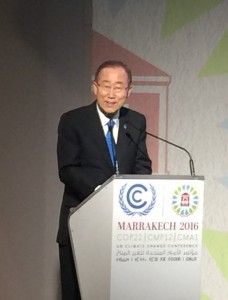
Representatives from the Women and Gender Constituency, the Business and Investor Constituency, the Youth Constituency, and Indigenous Peoples’ Constituency were invited to make a few remarks (also acknowledged were state and local authorities, farmers, and research constituencies present). The Women and Gender civil society speaker said that the test of a leader (according to Gandhi) is that s/he leaves behind in other people the will and ability to carry on, and Ban Ki-Moon had earned the title of leader. People pointed to how much work the General Secretary had done on the ground (he has been at COP this week), that he was a people’s representative, that he had from the first demonstrated concern for climate change, that he had vision. He inspired young people, the youth representative from China said, including when he stood at the front of the climate march in New York in 2014.

Moon urged all the civil society groups to continued action. There are many places where your voices and strong commitment can matter, he said. He felt he could not work on other UN development goals if the challenge of climate change was not met. He told representatives that, although he felt like a sprinter approaching the finish line, younger people had a lot of work to do to translate words on paper into action. Without this, they will be just words.
Reflections on Corporate Participation and Conflicts of Interest
One of the more interesting panels I have attended so far was held Tuesday morning (11/15) on “Addressing Conflicts of Interest in the Implementation of the Paris Agreement.” Having attended COP-19 in Warsaw, I was aware of the concern over participation of fossil fuel industries in the conference, of the booths set up by fossil fuel industries that aimed to persuade passers-by that they were environmentally progressive, that Poland (the host country) was heavily reliant upon coal and not ready to switch, and the fact that UNFCCC officials had a meeting with the coal industry during that conference. It seems the involvement of environmentally dirty industries in the COP has become more pervasive since then. The panel, which included Goodwin Ojo from Environmental Rights Action and Friends of the Earth International, Nigeria; Meena Raman of Third World Network, Lidy Nacpil representing Asian Peoples’ Movement for Debt and Development; Walter Schuldt, state delegate to COP from Ecuador; and Tamar Lawrence-Samuel of Corporate Accountability International, explored ways in which conflicts of interest posed problems for climate change negotiations, and how they should be dealt with.
Polluters have increasingly come to participate in the COP. Some years, they have come as representatives of their industries (as BINGOs—business and industry non-governmental actors—don’t you have to love these acronyms?) , and other years they will show up wearing badges of some nation (or the EU) as an official negotiator. Whichever hat they wear, they emphasize private sector interests; when they are delegates, they have a voice in the negotiations. Even as BINGOs, they get access that other non-governmental organizations do not have. Other NGOs (including environmental NGOs and research institutions) do not have the same access to official meetings at COP. BINGOs are able to submit documents (as other NGOs are not). And it looks as if, under UNFCCC auspices, banks direct some monies (adaptation/mitigation, Green Development Fund?) to some of these industries. Tamar Lawrence-Samuel of Corporate Accountability International outlined four ways corporate conflict of interest occurs: 1) direct lobbying by industry, and industry representatives joining official delegations; 2) industry lobby groups with legal status as non-profits who get NGO credentials (World Coal Assn, International Trading Association, etc); 3) Holding big side events that UNFCCC high-level folks attend; and 4) Platform(s) for corporations to pledge to take action on the climate (global climate action plan), and thereby greenwashing their actions.
Walter Schuldt, an official state delegate from Ecuador who was also instrumental in Tuesday’s meeting for consultation with indigenous peoples about the proposed new Platform, pointed out the SBI [Subsidiary Body for Implementation] report at COP22 does not include a conflict of interest statement, despite the efforts of their Latin American group that had support from some African groups. Schuldt, who I was drawn to as one of the rock stars (one of the really good guys) in these meetings, said that a significant part of government climate change expenditures goes through businesses (30%, I believe he said)—yet Corporations have been involved in environmental damages and human rights violations, putting the entire economy of nations in danger when having to press their cases against international corporations (there are examples in his region).
There are good models for conflict of interest rules out there. Schuldt pointed to the World Health Organization (WHO), which has set up a participatory framework for non-state actors. If a conflict of interest exists for a corporation, that entity has to be considered a private sector actor. The Human Rights Council has also worked to develop a binding agreement on international corporations involved in violations of human rights (the EU participated in this). Tamar Lawrence-Samuel (Corporate Accountability International) also pointed to important international examples of keeping industry at arms’ length in the negotiating process. The Global tobacco treaty shows that world leaders can (and have) stood up to powerful corporations. Tobacco interests did everything they could to weaken the agreement, but (Asian-Pacific and other) nations banded together to stop them. The treaty was unanimously adopted in 2003 (provision 5.3 recognizes the tobacco company’s profound and irreconcilable conflict of interest in health policy). This treaty is working, she said, and it helps speed up domestic laws to provide for public health (anti-tobacco laws).
Another point made by two speakers was that the legal systems in some of the LDCs are quite weak, and that national courts’ decisions against polluters (e.g., natural gas flaring in Nigeria, declared illegal in 2005) are often unenforced. They would like some UNFCCC help with the enforcement problem.
Various speakers pointed out that international safeguards and regulations on corporations will not be enough. Our governments can invoke our own right to deal with corporate investors within our countries. International law and regulation for transnational corporations important, of course—and they should be held accountable. It is important to be very careful how “nationally determined contributions” are getting defined to include interests of corporate actors (is coal-produced megawatt power excluded in the 70% reduction in emissions Philippines promised?).
Corporate social responsibility, self-depicted, was called greenwashing by several speakers. Godwin Ojo from Nigeria underscored the failure of voluntary mechanisms: corporations pollute and then build a hospital. Ojo (joined by others) used the term Ecoside to describe such actions. There need to be binding mechanisms, Ojo contended. Delegate Schuldt (Ecuador) pointed out that the achievement of sustainability has not yet been defined for non-developed country funding by UNFCCC, and that definition needs to have teeth.
Voices of Indigenous Peoples
On our first day, we went to the Forum for informal consultation with indigenous peoples on a proposed Platform for Indigenous Peoples, pursuant to paragraph 135 (non-party stakeholders) in the Paris Accord. Very few “parties” (state actors) attended–Bolivia and Ecuador seem to have spearheaded this effort; Australia, the EU, Sweden, Canada, Panama and a few others participated. There were many indigenous people observing, and several at the table speaking.
The purpose of the meeting was to “gather views and share information” from indigenous people, a demographic with a legacy of oppression. It is extremely unfortunate that while these countries contribute the least to CO2 emissions, they are also the ones who feel the full effects of climate change and are most heavily impacted. In moving forward, it is critical that they have the opportunity and voice to contribute to the design and implementation of actions. The First Nations spokespersons insisted that this must be a fully participatory process and that they must be active drivers of change, not passive agents.
I admired and respected how the representatives of indigenous peoples highlighted a common theme in their discussions: the importance of understanding the spiritual, traditional, and cultural dimension of knowledge. Walter Schuldt from the Permanent Mission of Ecuador to the United Nations pressed, “We must see Mother Earth as an integral part of nature, as human.” He stated that our collective responsibility to defend nature means that there must be legal implications to any violations against nature.
Kevin Hart, the Manitoba Regional Chief for the Assembly of First Nations, spoke on behalf of the Canadian delegation. He was joined by an elder from British Columbia who said, “Mother Earth can live without us; we cannot survive without Mother Earth,” and who spoke in opposition to a new hydroelectric dam at Fort St. John. Both Hart and the elder expressed their dissatisfaction with the lack of engagement and action. They emphasized that the first step in addressing climate change is to possess full awareness of the holistic issue at hand. The chief elder said, “We are stewards of the land. Our connection to the land is first and foremost based on the teachings that have been passed down in the memorial…Protecting the land and water is not an indigenous issue; it is a human issue.” Hart pressed for full respect of the constitutional treaty and for inherent human rights, supported by all levels of the government. He stated, “I’ve been to a lot of these meetings now, and we really need to move ahead.”
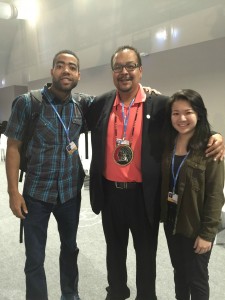
Ecuador and Bolivia, who seem to have pressed for this meeting, had several proposals for moving forward with the Platform. Bolivia suggested that there be indigenous peoples’ sessions at each COP and that the UN work to set up more meetings among indigenous peoples. Victoria Tauli-Corpus, the UN Special Rapporteur on the Rights of Indigenous People added that there should also be more virtual exchange of ideas and information on extending technologies of indigenous peoples, perhaps by means of a common website. She also said the Platform should be adopted at the next session of COP, and there should be a high level meeting of indigenous peoples’ technology at COP23.The representative from Ecuador suggested as well that there be an “Action agenda” for a full day on indigenous peoples at COP 23.
There was a state delegation from the EU at this meeting, and while they emphasized their support for human rights, including those of indigenous peoples, and with sharing technological best practices of indigenous peoples, they expressed a need for clarification about the platform and how and where it will fit into the framework and architecture of Paris. They seemed to be less ready to move forward with speed than did others in the room. We asked several parties (state representatives) and they suggested that the EU was somewhat wary because someone would have to pay for whatever was enacted, and/or that the EU was interested in maintaining control over the Paris process.
